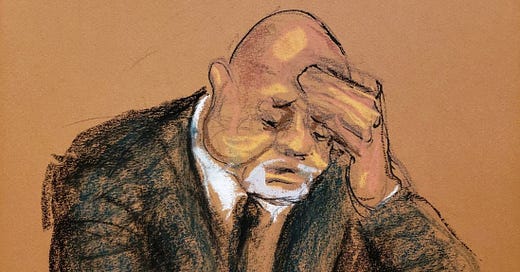“She was not my girlfriend.”
Jeffrey Epstein’s longtime former house manager Juan Alessi was cross-examined yesterday by Ghislaine Maxwell’s defense lawyers. The defense is trying to discredit Alessi’s testimony by painting him as an unreliable witness, and by asking why Maxwell is being charged with sex trafficking while Alessi is not, given what they say the nature of his role in Jeffrey Epstein’s sex trafficking empire was.
They began their questioning by referencing an incident that Alessi testified about on Thursday. He said then that in August 2004, two years after he quit his job, he snuck into Epstein’s house and stole $6,300 in hundred dollar bills.
Yesterday, the defense alleged that this was not the only time that Alessi had stolen from Epstein’s house, something Alessi vigorously denied. “You didn’t tell the jury the truth,” accused the defense. They claim that Alessi stole $5,600 dollars from Epstein in 2003 to pay for his girlfriend’s immigration papers. “She was not my girlfriend,” Alessi said, denying he had stolen any more money. Later, he said the woman the defense was referencing was a friend of his who was staying in his apartment, but that the money he had stolen was used to pay for those papers.
At the time Alessi stole the money, he said, “I was not poor, but the money was sequestered because I was going through a divorce.” This made selling the properties he owned impossible.
The defense asked Alessi about these properties, including one they said Epstein had loaned him $20,000 to purchase. Alessi confirmed that he owned those properties, including a multi-family home he bought in Wellington, Florida, for $330,000. And he acknowledged that Epstein had given him money for a down payment on a rental property. He also acknowledged that when he stopped working for Epstein, he was given a severance package of $50,000.
The defense also alleged that Alessi had entered Epstein’s house twice in August of 2004, the first time to try to steal a gun. When he couldn’t find the gun, he stole $1,900 in singles from Epstein, said Maxwell’s defense lawyers.
These claims made Alessi emotional and defensive. He sat pouting with his lips turned down as the defense continued their line of questioning.
In testimony on Thursday, Alessi claimed that after being confronted by Epstein following the break-in, hei had voluntarily turned himself in to the police. Alessi repeated this claim when the defense asked if he remembered being contacted by Michael Dawson, then a detective in the Palm Beach Police Department. “I went to the police on my own,” he said.
But Dawson testified later in the day that he went to look for Alessi himself in 2003.
“You went to Alessi’s house to talk with him,” said the defense.
“Yes...we did attempt to locate him,” Dawson replied.
But Alessi wasn’t at his home. His wife, Maria, who had worked with Juan for Epstein, was, and she gave Dawson Alessi’s phone number.
The defense laid out a narrative that contradicted Alessi’s testimony on Thursday, which Dawson agreed was correct on every point. He didn’t show up on his own, to make a statement, they said. Instead, he only came before Dawson called him. When he did meet with the police, he waived his Miranda rights, and said that he had indeed entered Epstein’s house to attempt to steal a gun. When he couldn’t find it in Epstein’s office, he stole the $1,900 in singles. Two weeks later, he returned again to steal more money. That time, he took $5,600 in singles. And he used that money, he told Dawson, to pay for his girlfriend’s immigration papers.


